A trip to CodeFest: startups, bait for designers and kanban!
Hello, dear Habrazhiteli.
Let me tell you about my experience of visiting the CodeFest developer conference , which took place last weekend in the glorious city of Novosibirsk.
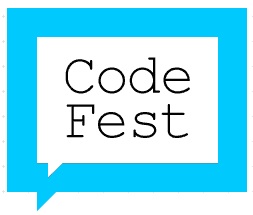
Under the cut, I will talk about the most interesting thoughts of the second day of the conference.
I just want to say that we only got on the second day of this event, since we were primarily interested in Project Management and Human Resources. Under the cut, I will talk about the most interesting thoughts of the second day of the conference.
')
And so, we arrived. We were met very nicely with delicious buns and unlimited coffee, only free Wi-Fi with excellent connection quality and number of points could please more.
Looking ahead a bit, I’ll say that we didn’t expect anything supernatural, and were pleasantly surprised by the ratio of excellent motivating reports that gave us a huge amount of material for reflection.
Of course, within the framework of 40-50-minute speeches, it was possible to only slightly touch on each topic, so it was already necessary to think out and digest all this on the way home.
Now, with your permission, for those who were not at CodeFest, I will give the main theses of the most interesting speakers to show that you missed. And for those who were at the conference - let it be a kind of list of theses, which should not be forgotten.
 And so, the first notable characters at the conference were Evgenia Smorodnikova and Pavel Pravdin. They made a very incendiary story about how to grow and sell startups. Of course, they did not have much time to tell, but pointed out the main mistakes of novice start-ups and suggested options for their solution:
And so, the first notable characters at the conference were Evgenia Smorodnikova and Pavel Pravdin. They made a very incendiary story about how to grow and sell startups. Of course, they did not have much time to tell, but pointed out the main mistakes of novice start-ups and suggested options for their solution:
Overall, the performance was very lively, and full of incentives to get up right now, and go to come up with an idea, design an interface and create a business model, then sell it profitably, and start getting the drive from the process of creating the next startup.
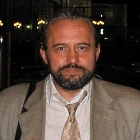 The young speakers were replaced by their experienced colleague Sergey Arkhipenkov from the SPM Guild. Strangely enough, his very mature and clever thoughts, even being designed in such a scientific and secret manner, still beat right into the brain, and I felt with their tailbone their importance and the need to implement the techniques mentioned. Sergey spoke about the system of adaptive project management - the direct continuation and development of flexible methodologies. In brief, his report boiled down to the seven basic principles of "good governance." Enumerating them in isolation from the context does not make sense, and retelling Sergey’s report will not work in this article. I think I can present my vision of his ideas in future posts.
The young speakers were replaced by their experienced colleague Sergey Arkhipenkov from the SPM Guild. Strangely enough, his very mature and clever thoughts, even being designed in such a scientific and secret manner, still beat right into the brain, and I felt with their tailbone their importance and the need to implement the techniques mentioned. Sergey spoke about the system of adaptive project management - the direct continuation and development of flexible methodologies. In brief, his report boiled down to the seven basic principles of "good governance." Enumerating them in isolation from the context does not make sense, and retelling Sergey’s report will not work in this article. I think I can present my vision of his ideas in future posts.
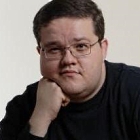 Contrasting with Sergey, Slava and Sasha (Vacheslav Pankratov and Alexander Orlov) came on the scene, their total experience was only 20 years versus 35 years per Sergey. It was a delight: the audience burst into laughter at each of their studies, they were the first to communicate their simple thoughts at first glance, with the help of a storm of gestures and emotional exclamations. The fact is that they spoke in absolutely simple words about the settlement of non-constructive behavior in a team, and offered simply the amazing idea of coaching non-constructive elements aka “ask the question so that the person himself comes to the right decision”.
Contrasting with Sergey, Slava and Sasha (Vacheslav Pankratov and Alexander Orlov) came on the scene, their total experience was only 20 years versus 35 years per Sergey. It was a delight: the audience burst into laughter at each of their studies, they were the first to communicate their simple thoughts at first glance, with the help of a storm of gestures and emotional exclamations. The fact is that they spoke in absolutely simple words about the settlement of non-constructive behavior in a team, and offered simply the amazing idea of coaching non-constructive elements aka “ask the question so that the person himself comes to the right decision”.
 Almost immediately after the lunch break, the vigorous emotional mood of the audience was cruelly broken by the gentlemen from Novotelecom, who talked about the “convenient, probably” (that’s how the speaker Alina Zherdev expressed it) for the online TV service, which has not yet been delivered to the customer.
Almost immediately after the lunch break, the vigorous emotional mood of the audience was cruelly broken by the gentlemen from Novotelecom, who talked about the “convenient, probably” (that’s how the speaker Alina Zherdev expressed it) for the online TV service, which has not yet been delivered to the customer.
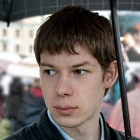 After them there were some pretty cool presentations: for example, Konstantin Gorsky from Yandex pleased the audience with his good sense of humor with a speech on the topic “How to find a Designer”. He talked about the designer's habitat, bait and free graphics for these creative creatures. The main idea was that the designer can not be selected by education, sex, age and nationality. The main criterion is the portfolio, not even the portfolio itself, but completed tasks. It is when the task is set, and the designer in the portfolio shows how he solved it, and why he did it this way - this is the real indicator of the designer's quality. Another interesting thought from Yandex is that you must ask the designer to remake something in the test task, and see how he reacts, because this is the usual stage in developing the design of any project.
After them there were some pretty cool presentations: for example, Konstantin Gorsky from Yandex pleased the audience with his good sense of humor with a speech on the topic “How to find a Designer”. He talked about the designer's habitat, bait and free graphics for these creative creatures. The main idea was that the designer can not be selected by education, sex, age and nationality. The main criterion is the portfolio, not even the portfolio itself, but completed tasks. It is when the task is set, and the designer in the portfolio shows how he solved it, and why he did it this way - this is the real indicator of the designer's quality. Another interesting thought from Yandex is that you must ask the designer to remake something in the test task, and see how he reacts, because this is the usual stage in developing the design of any project.
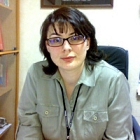 But the hall after Novotelecom was already filled only by a quarter, which meant that a subsequent miracle could be saved only by a miracle, but it never happened, even despite Yevgenia Shkuratova’s insanely interesting presentation from HR of the aforementioned Yandex.
But the hall after Novotelecom was already filled only by a quarter, which meant that a subsequent miracle could be saved only by a miracle, but it never happened, even despite Yevgenia Shkuratova’s insanely interesting presentation from HR of the aforementioned Yandex.
 Separately, it is worth highlighting an absolutely wonderful fighter for using Askhat Urazbayev’s flexible methodologies with a story about Kanban. He quite clearly and competently told how to use kanban within IT companies. Thanks to him for this, we have introduced this technique recently, but we are already feeling the first results.
Separately, it is worth highlighting an absolutely wonderful fighter for using Askhat Urazbayev’s flexible methodologies with a story about Kanban. He quite clearly and competently told how to use kanban within IT companies. Thanks to him for this, we have introduced this technique recently, but we are already feeling the first results.
In general, the impression of CodeFest remained just amazing, we left it, full of new ideas and thoughts, full of readiness for new challenges.
In conclusion, I would like to say that there is IT in Russia, and there are first-class experts in their field. We are grateful to the organizers for the opportunity to participate in such events even in Novosibirsk, which is so far from the center of Russia.
I want to add that I have nothing to do with the organization of this event, and in this article I simply tried to more fully describe what is happening from the inside, so that you understand what you can expect from them in the future.
PS Unfortunately, I didn’t have a camera with me, so I had to take photos of the authors from CodeFest.
Let me tell you about my experience of visiting the CodeFest developer conference , which took place last weekend in the glorious city of Novosibirsk.

Under the cut, I will talk about the most interesting thoughts of the second day of the conference.
I just want to say that we only got on the second day of this event, since we were primarily interested in Project Management and Human Resources. Under the cut, I will talk about the most interesting thoughts of the second day of the conference.
')
Arrival
And so, we arrived. We were met very nicely with delicious buns and unlimited coffee, only free Wi-Fi with excellent connection quality and number of points could please more.
Looking ahead a bit, I’ll say that we didn’t expect anything supernatural, and were pleasantly surprised by the ratio of excellent motivating reports that gave us a huge amount of material for reflection.
What happened?
Of course, within the framework of 40-50-minute speeches, it was possible to only slightly touch on each topic, so it was already necessary to think out and digest all this on the way home.
Now, with your permission, for those who were not at CodeFest, I will give the main theses of the most interesting speakers to show that you missed. And for those who were at the conference - let it be a kind of list of theses, which should not be forgotten.
 And so, the first notable characters at the conference were Evgenia Smorodnikova and Pavel Pravdin. They made a very incendiary story about how to grow and sell startups. Of course, they did not have much time to tell, but pointed out the main mistakes of novice start-ups and suggested options for their solution:
And so, the first notable characters at the conference were Evgenia Smorodnikova and Pavel Pravdin. They made a very incendiary story about how to grow and sell startups. Of course, they did not have much time to tell, but pointed out the main mistakes of novice start-ups and suggested options for their solution:- The most important reason for the uncertainty of startups, they called the imaginary "insufficiency of the initial capital." Their antithesis was to create startups with like-minded and burning ideas people who can be found in abundance at specialized conferences, websites, and even if you look around you, you can find like-minded people with programming skills / designer, etc.
- The second question that arises for all startups is “How to monetize the project?”, The answer was simple and obvious - “Create something that will be useful for people, even if they don’t know about it.” Here is such a brilliant advice, which many unfortunately neglect.
- And third, “I don't have enough experience.” As the authors of the report clearly noted: “Nobody starts start-ups being experienced in this field, and for that they are start-ups, that you should be the first!”.
Overall, the performance was very lively, and full of incentives to get up right now, and go to come up with an idea, design an interface and create a business model, then sell it profitably, and start getting the drive from the process of creating the next startup.
 The young speakers were replaced by their experienced colleague Sergey Arkhipenkov from the SPM Guild. Strangely enough, his very mature and clever thoughts, even being designed in such a scientific and secret manner, still beat right into the brain, and I felt with their tailbone their importance and the need to implement the techniques mentioned. Sergey spoke about the system of adaptive project management - the direct continuation and development of flexible methodologies. In brief, his report boiled down to the seven basic principles of "good governance." Enumerating them in isolation from the context does not make sense, and retelling Sergey’s report will not work in this article. I think I can present my vision of his ideas in future posts.
The young speakers were replaced by their experienced colleague Sergey Arkhipenkov from the SPM Guild. Strangely enough, his very mature and clever thoughts, even being designed in such a scientific and secret manner, still beat right into the brain, and I felt with their tailbone their importance and the need to implement the techniques mentioned. Sergey spoke about the system of adaptive project management - the direct continuation and development of flexible methodologies. In brief, his report boiled down to the seven basic principles of "good governance." Enumerating them in isolation from the context does not make sense, and retelling Sergey’s report will not work in this article. I think I can present my vision of his ideas in future posts. Contrasting with Sergey, Slava and Sasha (Vacheslav Pankratov and Alexander Orlov) came on the scene, their total experience was only 20 years versus 35 years per Sergey. It was a delight: the audience burst into laughter at each of their studies, they were the first to communicate their simple thoughts at first glance, with the help of a storm of gestures and emotional exclamations. The fact is that they spoke in absolutely simple words about the settlement of non-constructive behavior in a team, and offered simply the amazing idea of coaching non-constructive elements aka “ask the question so that the person himself comes to the right decision”.
Contrasting with Sergey, Slava and Sasha (Vacheslav Pankratov and Alexander Orlov) came on the scene, their total experience was only 20 years versus 35 years per Sergey. It was a delight: the audience burst into laughter at each of their studies, they were the first to communicate their simple thoughts at first glance, with the help of a storm of gestures and emotional exclamations. The fact is that they spoke in absolutely simple words about the settlement of non-constructive behavior in a team, and offered simply the amazing idea of coaching non-constructive elements aka “ask the question so that the person himself comes to the right decision”.Dinner. Continuation
 Almost immediately after the lunch break, the vigorous emotional mood of the audience was cruelly broken by the gentlemen from Novotelecom, who talked about the “convenient, probably” (that’s how the speaker Alina Zherdev expressed it) for the online TV service, which has not yet been delivered to the customer.
Almost immediately after the lunch break, the vigorous emotional mood of the audience was cruelly broken by the gentlemen from Novotelecom, who talked about the “convenient, probably” (that’s how the speaker Alina Zherdev expressed it) for the online TV service, which has not yet been delivered to the customer. After them there were some pretty cool presentations: for example, Konstantin Gorsky from Yandex pleased the audience with his good sense of humor with a speech on the topic “How to find a Designer”. He talked about the designer's habitat, bait and free graphics for these creative creatures. The main idea was that the designer can not be selected by education, sex, age and nationality. The main criterion is the portfolio, not even the portfolio itself, but completed tasks. It is when the task is set, and the designer in the portfolio shows how he solved it, and why he did it this way - this is the real indicator of the designer's quality. Another interesting thought from Yandex is that you must ask the designer to remake something in the test task, and see how he reacts, because this is the usual stage in developing the design of any project.
After them there were some pretty cool presentations: for example, Konstantin Gorsky from Yandex pleased the audience with his good sense of humor with a speech on the topic “How to find a Designer”. He talked about the designer's habitat, bait and free graphics for these creative creatures. The main idea was that the designer can not be selected by education, sex, age and nationality. The main criterion is the portfolio, not even the portfolio itself, but completed tasks. It is when the task is set, and the designer in the portfolio shows how he solved it, and why he did it this way - this is the real indicator of the designer's quality. Another interesting thought from Yandex is that you must ask the designer to remake something in the test task, and see how he reacts, because this is the usual stage in developing the design of any project. But the hall after Novotelecom was already filled only by a quarter, which meant that a subsequent miracle could be saved only by a miracle, but it never happened, even despite Yevgenia Shkuratova’s insanely interesting presentation from HR of the aforementioned Yandex.
But the hall after Novotelecom was already filled only by a quarter, which meant that a subsequent miracle could be saved only by a miracle, but it never happened, even despite Yevgenia Shkuratova’s insanely interesting presentation from HR of the aforementioned Yandex. Separately, it is worth highlighting an absolutely wonderful fighter for using Askhat Urazbayev’s flexible methodologies with a story about Kanban. He quite clearly and competently told how to use kanban within IT companies. Thanks to him for this, we have introduced this technique recently, but we are already feeling the first results.
Separately, it is worth highlighting an absolutely wonderful fighter for using Askhat Urazbayev’s flexible methodologies with a story about Kanban. He quite clearly and competently told how to use kanban within IT companies. Thanks to him for this, we have introduced this technique recently, but we are already feeling the first results.In general, the impression of CodeFest remained just amazing, we left it, full of new ideas and thoughts, full of readiness for new challenges.
In conclusion, I would like to say that there is IT in Russia, and there are first-class experts in their field. We are grateful to the organizers for the opportunity to participate in such events even in Novosibirsk, which is so far from the center of Russia.
I want to add that I have nothing to do with the organization of this event, and in this article I simply tried to more fully describe what is happening from the inside, so that you understand what you can expect from them in the future.
PS Unfortunately, I didn’t have a camera with me, so I had to take photos of the authors from CodeFest.
Source: https://habr.com/ru/post/115859/
All Articles